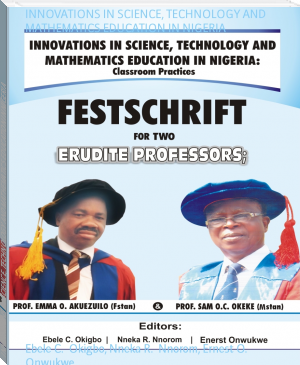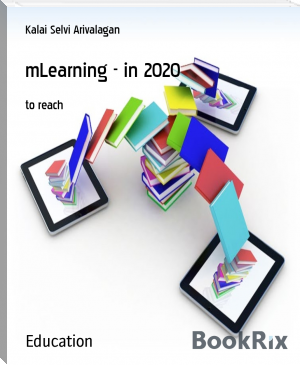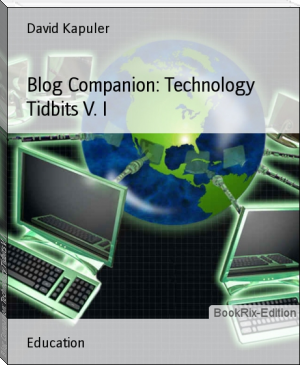INNOVATIONS IN SCIENCE, TECHNOLOGY AND MATHEMATICS EDUCATION IN NIGERIA - Ebele C. Okigbo, Nneka R. Nnorom, Ernest O. Onwukwe (best novel books to read TXT) 📗

- Author: Ebele C. Okigbo, Nneka R. Nnorom, Ernest O. Onwukwe
Book online «INNOVATIONS IN SCIENCE, TECHNOLOGY AND MATHEMATICS EDUCATION IN NIGERIA - Ebele C. Okigbo, Nneka R. Nnorom, Ernest O. Onwukwe (best novel books to read TXT) 📗». Author Ebele C. Okigbo, Nneka R. Nnorom, Ernest O. Onwukwe
Variable N Mean S.D df t-cal P Remark
Male 27 54.10 3.86
Female 23 50.82 3.50
Table 4 showed that the calculated p-value is 0.67 which is greater than the level of significance at 0.05 with df of 98. This means that there was no significant difference between the posttest scores of male and female students taught geometry using game-based teaching strategy. Therefore, hypothesis two was retained.
Discussion of the Findings
The analysis in Table 3 revealed that a significant difference existed between the mean performance scores of students taught geometry concepts using game-based learning strategy and those taught using conventional teaching strategy. The result was in favour of the experimental group as shown in their mean scores and t-value. This finding tends to support the research of Aburime (2003), where students who were exposed to practical activities proved to perform better than their counterparts who were not exposed to practical activities. It also agrees with those of Imoko and Isa (2015); Chai-li, Ting-Kuang and Chen-Yen (2014); Chun,Iwen and Gwo-Jen (2014); Mohammed, Abu Bakar, Ali, Ibrahima and Hassan (2014) that the use of games in teaching and learning improves learners achievement.
Furthermore, the analysis in Table 4 shows that there was no significant difference between the mean achievement scores in terms of gender. That of male students is the same with that of the female students who were both exposed to game based approach. This shows that sex status does not have any significant impact in the mean scores of students taught geometry concepts using game-based teaching strategy in the experimental group. This is because exposing students to game-based teaching strategy improved performance in geometry among male and female students. This is in line with the research findings of Baumert and Schnabel (2001) which found that the application of instructional treatment on a mixed gender school population improves the academic achievements of students irrespective of gender. Therefore, game-based teaching strategy is gender friendly.
Major findings
There was a significant difference between the mean scores of students taught geometry concept using game-based teaching strategy and those taught using the conventional strategy.
There was no significant difference between the posttest scores of male and female students taught geometry concept using game-based teaching strategy.
Conclusion
The study investigated the effects of game-based learning on senior secondary school student’s achievement in geometry in Awka South local government area of Anambra state. The result of the study indicates a significant difference in the two teaching methods employed, in favor of game-based learning; in addition, there was gender influence in the study. It can be deduced therefore that game-based learning is effective in teaching and learning of mathematics. Therefore, if given the chance in our secondary schools game-based learning may be a means of improving learners’ achievement in mathematics for the attainment of vision 20:20:20 in our nation at large.
Recommendations
Taking into consideration, the importance of the study with the view that it could be used outside the area of study, the researcher has deemed it necessary to give the following recommendations:
The importance of game based learning of mathematics should be considered in teachers training institutions.
2. Game based learning approach should be incorporated in the mathematics curriculum teacher’s training schools.
3. Teachers should be dynamic in the type of game they employ in the process of teaching depending on the topic and concept.
4. Adequate supervision to ensure the use and understanding of game based learning approach should be ensured by the appropriate bodies concerned.
5. Educational administrators should organize seminars and workshops for secondary school teachers from time to time in order to update their knowledge on game based learning.
School authorities should not be too rigid to accept new and improved ways of learning mathematics.
The government should build mathematics laboratories and equip them with game based learning materials both digital and manual.
They should also send supervisors to inspect the proper use and management of these laboratory materials
References
Abakpa, R., Benjamin, O., &Iji, C. (2013). The effect of mastery learning approach on senior secondary school students achievement in geometry.Benue Journal of Research in Science and Science Education, 38(1), 163-176.
Abirime, F.E. (2003). Geometrical manipulative as mathematics resources for effective instructions in junior secondary schools. The journal of world council of curriculum and instruction, Nigeria Chapter Forum 4(2), 74-83.
Agwagah, U. (2013). Improving the teaching of mathematics language on errors committed by senior secondary school students in bearing problems in Omuo-Ekiti, Nigeria. Abacus, the Journal of the Mathematical Association of Nigeria, 38(1), 50-56.
Ahmad, M. (2016). Impact of scalpfolding –enrich collaborative strategy on test-anxiety, Retention and performance in geometry. Unpublished Ph.Dthesis, Faculty of Education, ABU Zaria.
Ahmad, M. &Idris, T. (2017). Impact of scaffolding learning strategy on Performance and retention in geometry among secondary school students in Niger State. Minna Journal of Science Education and Allied Research, 5(1), 11-18.
Birgan, I.J. (2010). The effects of multimedia technology on students’ perception and retention rates in mathematics at a community college. Dissertation, North Central University.
Etsu, S. & Ahmad, M. (2018). Effect of laboratory-based activity on geometryPerformance of slow learners among junior secondary school students in Mathematics. Abacus: A Journal of Mathematical Association of Nigeria, 4(3), 61-74.
Galadima, I. &Okogbenin, M.(2012). Effects of mathematics games on Academic performance and attitudes of senior secondary school students in Mathematics. Abacus: A Journal of Mathematical Association of Nigeria, 37(1), 23-28
Gimba, R.W. (2013). Effect of computer package on achievement, retention and interest in set theory among secondary school students in Niger State. Unpublished Ph.D thesis, University of Nigeria, Nsukka.
Odetola, C. & Salaman, M.F.(2014). Effects of mathematical language on errors committed by senior secondary school students in bearing problems in Omuyo-Ekiti, Nigeria. Abacus the Journal of the mathematics Association of Nigeria, 37(1), 107-109.
Olunloye, O. (2010). Mass failure in mathematics: a national disaster. Tribune of 7, February 2010 Retrieved from http://www.tribune.com.nig on May 8, 2011.
Chai-li, T.K. & Chin-Yen, T. (2015). The effects of game based learning and anticipation of 10th grade Geology students. Eurasia Journal of Mathematics Science & Technology Education, 2016, 12(5), 1379-1388.
Champion, E. M. (2008). Otherness of place: Game-based interaction and learning in virtual heritage projects. International Journal of Heritage Studies,14(6),210-228.
Chun, I. & Gwo-Jen Y. (2014). Effects of digital game based learning on Students self efficacy, motivation, anxiety and achievements in learning mathematics. J comp. edu.2014 1 (2-3); 151-166.
Connolly, T. M., Stans field, M., & Hainey, T. (2007). An application of games-based learning within software engineering. British Journal of Educational Technology, 38(5), 416-428.
Harris, J. (2009). Teachers’ technological pedagogical content knowledge and Learning activity types: Curriculum based technology integration Reframed. Journal of Research on Technology in Education, 41(4), 393- 416.
Imoko U. & Isa A. (2015). Impact of computer games on pupil’s achievement in Mathematics in primary schools. Journal of Science education, 5(6), 101-124.
Mohammed, Abu B., Ali, I. & Hasan, A. (2014) . The impact of video games in children’s learning of mathematics online. Journal of interactive online learning, 7(2), 139-159.
West African Examinations Council (WAEC), (2010-2016). West African Examination Council May/June Chief Examiner Reports.
EFFECTOF REGULATORY SELF-QUESTIONING STRATEGY ON SECONDARY SCHOOL STUDENTS’ ACADEMIC ACHIEVEMENT IN CHEMISTRY
Joy A. Eke
&
Dr. Peter I.I. Ikokwu
Abstract
The study investigated the effect of regulatory self-questioning (RSQ) strategy on students’ achievement in Chemistry. Two research questions guided the study and three null hypotheses were formulated and tested at 0.05 level of significance. The study adopted a quasi- experimental design, specifically, the pre-test post-test non-equivalent control group design. The sample consisted of 95 senior secondary year one (SS1) chemistry students from two co-educational schools in Onitsha North local government area of Anambra state chosen through purposive sampling technique. Students in experimental group were instructed on chemistry concept gas law using regulatory self-questioning strategy, while control group was taught the same topic using lecture method. .Achievement Test on Gas Laws (ATOGL) instrument developed by the researchers and duly validated by three experts was used for date collection. The reliability of the ATOGL was obtained using Kuder Richardson 20 (KR-20) formula and the coefficient of internal consistency was found to be 0.80. Data collected were analysed using mean and standard deviation to answer the research questions and Analysis of Covariance (ANCOVA) was used to test the hypotheses at 0.05 level of significance. The findings of the study showed that there was a significant effect of RSQ strategy on students’ achievement in chemistry. Thus, regulatory self questioning instruction enhances students’ academic achievement. Gender was found to have no significant influence on achievement of students taught chemistry using self questioning instructional strategy. However, no significant interaction effect was observed between gender and treatment. Based on these findings, educational implications of the study were raised and recommendations were made. The researchers recommend that RSQ instruction should be adopted regularly in the classroom so as to help students learn material more efficiently and enhance their academic achievement.
Keywords: Regulatory self questioning strategy, gender and academic achievement
Introduction
The aim of teaching at any level of education is to bring about a desirable change in behavior of the learner (Tebabal & Kahssay, 2011). The 'change" is then achieved through instruction within the school disciplines. Chemistry is one of the disciplines through which the educational objectives are to be achieved. It is the science that systematically studies composition, properties and activities of organic and inorganic substances and various elementary forms of matter (Nnoli, 2011). Chemistry plays a vital role in the future progress of mankind and the nation. According to the Nigerian Educational Research and Development Council (NERDC, 2007), it is very important for effective living in modern age of science and technology. Given its application in industries, and in many other professions, the minimum standard embodied in chemistry education is designed to build confidence in students and enhance their abilities to adapt to the changing situation in a scientifically and technologically oriented society. Based on these important roles of chemistry, students are expected to manifest high level of achievement in the subject.
Some studies yet show that learners have difficulty in understanding many concepts in chemistry courses, have conceptual misunderstandings regarding these concepts (Karaçöp & Doymuş, 2012; Piquette & Heikkinen, 2005; Treagust, Chittleborough & Mamiala, 2003). The subject of "gases" laws is one of the concepts that learners have a hard time learning (Doymuş, 2007; Hammar, 2013). According to Okwuduba (2016), the most challenging chemistry topic for learners is the "gas Laws." Students have difficulty understanding the relationships between volume, temperature, and pressure. Students tend to apply localized reasoning when challenged with the task concerning gas laws .Okwuduba further found that students solving problems in gas laws often ignored or modified the mathematics when their results contradicted their expectations. The reason for this seems to that gas concepts are too abstract for them ( Kariper, 2013). To make students understand the gas law concepts and improve on their achievement it will be required of teachers to use the appropriate method and strategy that best suits the learner and to achieve the objectives and desired goal.
The poor academic achievement by majority of the students in some subject areas is basically linked to the application of ineffective teaching methods by teachers to impact knowledge to learners (Adunola, 2011). Substantial research findings showed that most of the traditional methods used by teachers were teacher- centered with no activity for the learners making them passive and therefore obtaining knowledge from the teacher without building their engagement level with the subject matter, the approach is least practical, more theoretical and memorizing leading to poor performance (Tebabal & Kahssay ,2011). The need therefore call for teachers to try to use students centered approaches in order to improve students' achievement. Many studies that focused on the subject of gases have found that employing students centered methods and techniques to teach helps learners improve their performance level ( Mukadder, 2016). Hence, in this study regulatory self questioning was employed in teaching chemistry concept gas laws as to determine its effect on students’ academic achievement.
Regulatory Self Questioning (RSQ) is a of strategy that has shown promising outcomes for a range of diverse learners across grade and ability levels (.Pate & Miller 2011).RSQ is





Comments (0)